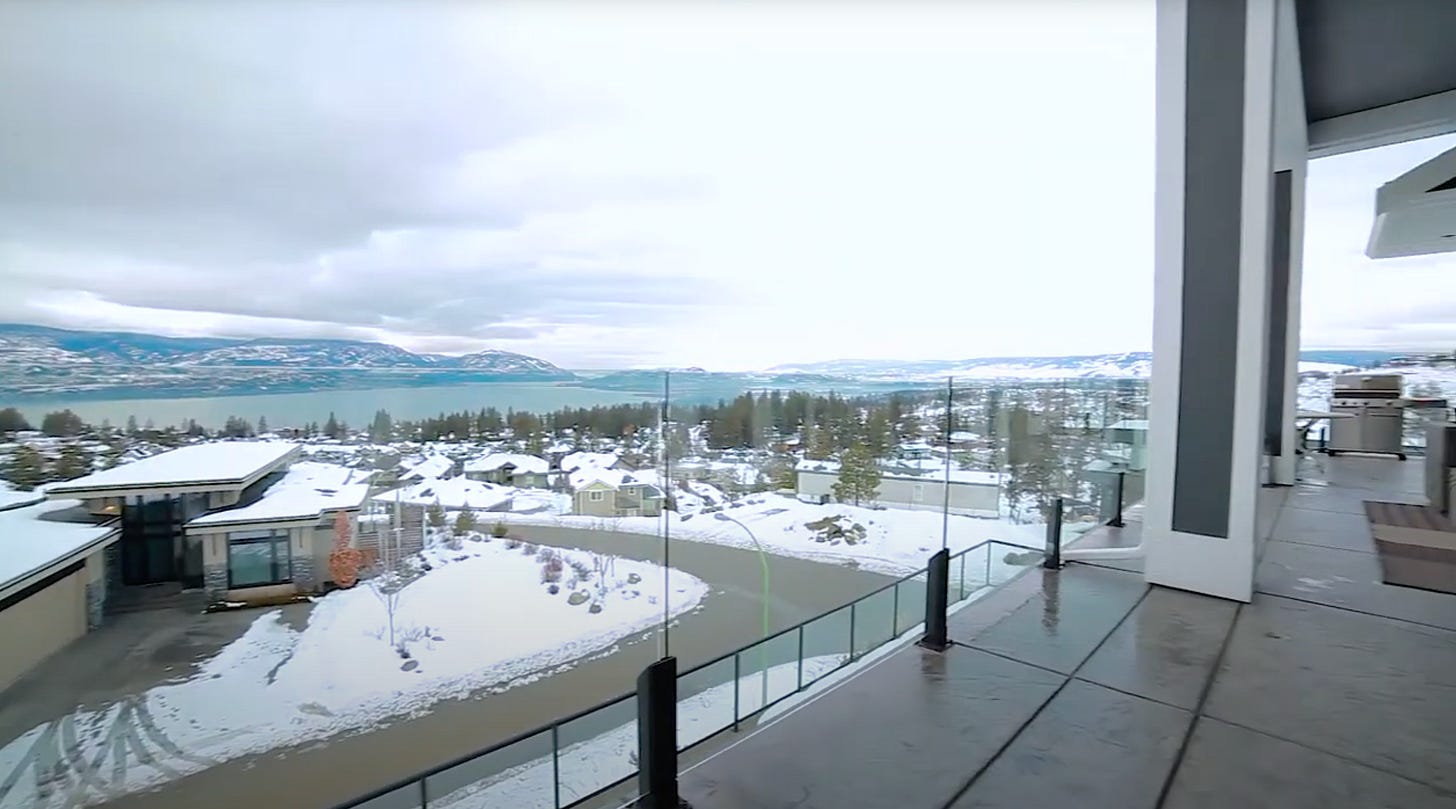Fentanyl Pill Raid in Okanagan, Near Falkland Superlab, Linked to Additives Found in U.S.–Mexico Border Seizures
CBSA seizure of 20 kilograms of mislabelled caffeine leads to Kelowna mansion raid, exposing alleged trafficking network tied to repeat suspect and echoing U.S.–Mexico fentanyl pill-press practices.

KELOWNA — Six months ago, Canada Border Services officers intercepted a 20-kilogram shipment of caffeine powder mislabelled as white pigment — a break that set in motion an RCMP investigation into fentanyl trafficking in the desert-like hills above Kelowna, overlooking British Columbia’s Okanagan Lake. The lake, a summer playground for luxury speedboats and party crowds, lies just 100 kilometres south of Falkland, the site of Canada’s most notorious narcotics superlab dismantled in 2024.
The CBSA intercept led investigators to a raid on a hillside mansion on Pen Lane in Kelowna — a 4,336-square-foot home boasting a chef’s kitchen, temperature-controlled wine cellar, walk-in shower spa, weight room, gleaming wood floors, and a saltwater pool with sweeping lake views. The address sits in a region increasingly associated with luxury real estate, surging opioid-overdose deaths, and entrenched drug-lab networks tied to Mexican cartels.
Kelowna remains one of B.C.’s hardest-hit communities in the toxic-drug crisis. BC Coroners Service data released in 2025 show the city on pace to break its annual overdose-death record, with 35 deaths in the first four months of 2025, amid province-wide mortality that continues at roughly five deaths per day.
According to filings from British Columbia’s Civil Forfeiture Office, a May 27, 2025 raid on a mansion in the 400-block of Pen Lane uncovered what police allege was a fentanyl-trafficking operation tied to Brandon William Tuovila. Court records show Tuovila was previously charged with possession of fentanyl, heroin, and cocaine for the purpose of trafficking in a nearly identical RCMP raid in 2016. That earlier case advanced through a preliminary inquiry but never reached trial or conviction. The new allegations remain unproven, and both Tuovila and co-defendant Amanjit Kaur Grewal have not yet filed responses to the civil forfeiture notice of claim.
The forfeiture action, filed in B.C. Supreme Court on September 10, targets $17,560 in cash seized inside the Pen Lane residence. Investigators said the money was vacuum-sealed in mixed bundles, packaged in a manner inconsistent with legitimate banking. The claim names Tuovila and Grewal as defendants, and says both lived at the property.
Separate criminal filings show that Tuovila and Grewal were also charged in Kelowna with multiple counts of possession of controlled substances for the purpose of trafficking, as well as firearms offences, in 2020 and 2021. On June 11, 2020, Tuovila was charged with possession for the purpose of trafficking. On March 26, 2021, both Tuovila and Grewal were jointly charged with two further trafficking counts and two counts of possessing a firearm without a licence. No convictions resulted.
Tuovila’s earlier charges in B.C. courts also apparently faltered before trial. On June 14, 2016, he and co-accused Danae Elizabeth Manore were charged in West Kelowna with three trafficking counts after RCMP seized 372 grams of suspected crack cocaine — amounting to 910 pieces pre-packaged for street sale — along with 137 grams of suspected fentanyl, 82 grams of suspected heroin packaged into 350 street-level pieces, and more than $30,000 in Canadian currency. Officers also documented equipment consistent with the sale of drugs. Court records show no trafficking convictions followed.
In the new case, the significance of the CBSA’s interception of 20 kilograms of mislabelled caffeine has not been explained in filings. But public-health sources note that bulk caffeine is routinely used as an adulterant in cocaine and heroin, and is commonly present in counterfeit fentanyl tablets as a filler to alter perceived potency. In fact, a June 2024 forensic report — Sentinel Snapshot: Qualitative Analysis of Counterfeit Tablets Seized at the U.S. Southwest Border — analyzed more than 1,200 counterfeit “M30” pills seized by U.S. Customs and Border Protection. Researchers found that while the tablets contained over 95 percent fentanyl and related precursors, they also carried a range of additives including acetaminophen and caffeine, which appeared in about 1.2 percent of samples.
In that context, CBSA’s interception of 20 kilograms of mislabelled caffeine in Kelowna gains added weight, echoing the same blending practices documented in fentanyl pills seized along the U.S.–Mexico border.
Keep reading with a 7-day free trial
Subscribe to The Bureau to keep reading this post and get 7 days of free access to the full post archives.

